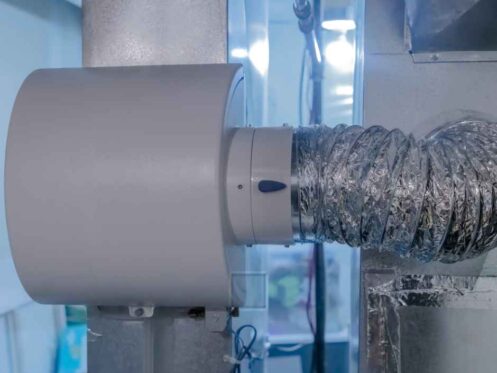Humidifiers are a fantastic way to add moisture to the air, improving indoor air quality and providing relief for dry skin, sinuses, and other cold-weather discomforts. However, if you’ve ever wondered, “Why does my humidifier smell?”, you’re not alone. A strange odor coming from a humidifier is a common problem that can stem from several causes, some of which could even affect your health. This blog will explore the reasons behind a humidifier smell, discuss whether it’s dangerous, and outline solutions to keep your humidifier clean and odor-free.
Why Does My Humidifier Smell?
A humidifier is designed to emit clean, refreshing mist, so any off-putting scent is a clear indication that something isn’t right. There are a few reasons why a humidifier smells, ranging from simple maintenance issues to underlying problems that require attention. Here are the most common causes:
Bacterial Growth in the Water Tank
One of the primary reasons for a humidifier smell is bacteria buildup in the water tank. When water sits in a humidifier for too long, bacteria, mold, and mildew can grow, leading to an unpleasant musty odor. This is especially true if you don’t empty the tank between uses or if you’re using untreated tap water, which can introduce more bacteria into the system.
Mineral Deposits from Hard Water
If you use hard water in your humidifier, mineral deposits can accumulate on the interior surfaces, affecting its performance and creating an unpleasant odor. These deposits can harbor bacteria and contribute to the humidifier’s musty smell. To avoid this, using distilled or filtered water can minimize mineral buildup, improving the overall lifespan of your humidifier.
Dirty Humidifier Filter
Some humidifiers contain filters that help purify the water before it’s emitted as mist. Over time, these filters can become clogged with impurities and begin to smell. If you notice your humidifier smells musty, it’s worth checking the filter. Replacing or cleaning the filter as recommended by the manufacturer can prevent bacteria buildup and ensure fresh, clean mist.
Standing Water and Mold Growth
Leaving water in the humidifier when it’s not in use can create the perfect environment for mold and mildew to thrive. Mold growth can result in a musty odor, which many people find offensive. Additionally, mold spores can be released into the air when the humidifier runs, potentially leading to health problems, particularly for those with allergies or respiratory issues.
Lack of Regular Cleaning and Maintenance
Humidifiers require regular cleaning to prevent odors and ensure they operate efficiently. If you notice that your humidifier smells frequently, it may be due to a lack of cleaning. Neglecting regular maintenance allows bacteria and mold to build up over time, creating a persistent odor. A cleaning routine can help keep your humidifier in peak condition and prevent unwanted smells.
Burning Smell from Electrical Issues
Sometimes, a humidifier may emit a burning smell due to electrical or motor issues, especially in older units. If you notice this type of odor, it’s important to stop using the humidifier immediately and consider having it inspected or replaced. A burning smell may indicate an electrical malfunction that could pose a safety risk.
Humidifier Smells Musty: Is It Dangerous?
A humidifier smells musty—is it dangerous? While a musty odor in itself may not be dangerous, the cause of the smell often can be. Here’s why addressing a musty-smelling humidifier is essential:
- Potential Health Risks: When a humidifier is contaminated with mold, bacteria, or mildew, it can release these particles into the air. Breathing in mold spores or bacteria can irritate the respiratory system, potentially leading to coughing, sneezing, or even infections in sensitive individuals, especially those with asthma, allergies, or weakened immune systems.
- Reduced Air Quality: The primary purpose of a humidifier is to improve indoor air quality, but if it’s releasing musty odors, it’s likely doing the opposite. Contaminants from a dirty humidifier can worsen indoor air quality, counteracting the humidifier’s intended benefits.
- Damage to Humidifier Components: Mineral buildup, mold, and bacteria can damage humidifier components over time, shortening the unit’s lifespan and potentially increasing the need for humidifier repair.
For these reasons, it’s crucial to address any unpleasant humidifier smell promptly. Letting odors persist can have negative effects on both the air you breathe and the humidifier itself.
How to Get Rid of Humidifier Smells
The good news is that there are several simple steps you can take to eliminate unpleasant odors and keep your humidifier smelling fresh.
1. Regularly Clean the Water Tank
The most effective way to prevent and eliminate odor is to clean the water tank thoroughly. After each use, empty the tank, rinse it with fresh water, and wipe it dry. Once a week, use a gentle cleaning solution—such as a mixture of vinegar and water—to disinfect the tank. This helps kill bacteria, mold, and mildew before they have a chance to multiply.
2. Replace the Filter Regularly
If your humidifier has a filter, be sure to check the manufacturer’s guidelines for cleaning or replacing it. A clogged or dirty filter can contribute to musty odors. Regularly replacing the filter can help keep your humidifier operating efficiently and prevent odor-causing bacteria from building up.
3. Use Distilled Water
Using distilled or filtered water instead of tap water can help prevent mineral buildup, which is a common cause of humidifier smells. Distilled water has fewer impurities and minerals, reducing the likelihood of odors and extending the life of your humidifier.
4. Avoid Standing Water
Leaving water in the humidifier when it’s not in use creates a breeding ground for bacteria. Empty the water tank after each use, and make sure to dry it thoroughly. This simple practice can go a long way in preventing unpleasant odors.
5. Deep Clean Periodically
Even with regular cleaning, a humidifier may occasionally need a deep clean. Once a month, soak the tank and removable parts in a solution of water and white vinegar or hydrogen peroxide. After soaking, scrub any stubborn deposits with a soft brush, then rinse thoroughly. This helps to remove any buildup that routine cleaning might miss.
6. Get Professional Help When Needed
If you’re dealing with persistent odors or suspect there might be an issue beyond simple cleaning, a professional inspection can be beneficial. In some cases, persistent odor problems may require humidifier repair or replacement parts to ensure optimal function.
Preventing Humidifier Smells in the Future
Preventing odor is often easier than getting rid of it once it starts. Here are a few best practices to keep your humidifier fresh:
- Stick to a cleaning schedule that includes both regular and deep cleaning.
- Replace the filter as directed by the manufacturer.
- Always use distilled water to minimize mineral deposits.
- Avoid overuse of the humidifier, as extended periods of use can lead to more residue buildup.
- Store your humidifier in a dry, clean space when it’s not in use to prevent mold and bacteria growth.
Contact Jim Needham Heating Cooling Plumbing & Drain for Humidifier Maintenance and Repair
Experiencing a persistent humidifier smell or have questions about maintaining your unit? Proper humidifier maintenance not only prevents odors but also ensures clean, healthy air in your home. Contact Jim Needham Heating Cooling Plumbing & Drain for all your humidifier repair and maintenance needs to keep your humidifier in peak condition. Let our team help you maintain a fresh and functional humidifier for a healthier home environment.

